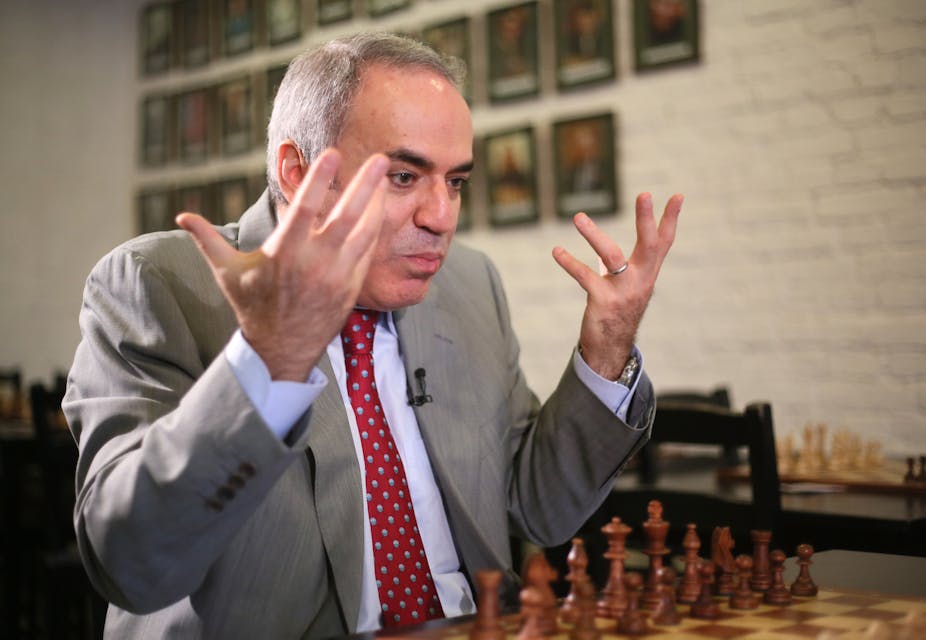Garry Kasparov’s unsuccessful campaign for the presidency of chess’ governing body, the Fédération Internationale des Échecs (FIDE), has once again seen chess became an arena for political and ideological quarrels. Former champion Kasparov was the sole challenger to Kirsan Ilyumzhinov, who has led FIDE for 19 years. Both men are products of Soviet Russia and represent alternative visions of post-Cold War politics and chess.
For Kasparov, Ilyumzhinov – former leader of the Russian Republic of Kalmykia and backed by the Putin – represents the overflow of authoritarian politics into Russian culture. For Ilyumzhinov, Kasparov – a figurehead of the anti-Putin Other Russia coalition – represents a divisive figure, on and off the chessboard. As a sometime critic of Vladimir Putin, Kasparov’s bid to wrest control of FIDE from Ilyumzhinov can be seen as a political act.
But FIDE becoming a battleground setting is nothing new. Chess has a long history of acting as a proxy for political and national conflicts.
Even in the 19th century, chess was used as a site for international and political competition. When Frenchman Louis-Charles Mahé de La Bourdonnais beat Irishman Alexander McDonnell in 1834, the match was given extensive media coverage for the time.
The Chess Player’s Chronicle, for example, published a satirical poem, “The Revenge Of Waterloo”, celebrating Bourdonnais’ triumph in strident martial tones, demonstrating chess’s function as an important symbol of national pride.
Not long later, in 1858, the chessboard became a proxy of another international rivalry. When the American Paul Morphy beat the traditional European grand masters in the famous “Opera Game”. Morphy’s win was celebrated as a “Yankee” victory over the “Old World”. In many ways this foreshadowed the American Bobby Fischer’s 1972 disruption of established 20th-century Soviet chess dominance.
Bobby Fischer’s victory over Boris Spassky ended a 24-year Soviet hold on the World Chess Championship, provoking the “nearest thing to a chess riot one could ever hope for”.
Soviet dominance in the game following World War II meant the match was framed in terms of the Cold War rivalry. And the game took on the values and metaphors of the two contradictory economic and political systems. In the US, where the chess was previously regarded as too intellectual and too Russian, American values of competition, hard work, and good old-fashioned capitalism, were appropriated to generate support for the game.
In this context, Fischer suddenly became something of a folk hero to the American public. He was also outspokenly anti-Russian at a time of increasing cooperation and diplomacy between American and Soviet governments. This was confirmed by President Nixon’s refusal to meet the new champion after the game.
The 1972 match was a symbol of both East-West co-operation and rivalry. Fischer’s disappearance from the game after this match and the decline in chess interest in the US, only confirmed the web of culture, commerce, politics and personality which the 1972 match bound together.
Within Russia too, chess has long been a battlefield of politics. In the 1980s Garry Kasparov was involved in another battle for world chess supremacy. His 1984-85 world chess championship match against Anatoly Karpov is celebrated as a classic and was even seen as a harbinger of the collapse of communism – in the Western media at least – with Kasparov as the anti-Communist hero. Karpov, meanwhile was depicted as a grey, Soviet stooge who, as well as chess playing, was represented as an advocate of Marxism and stamp collecting.
Today, Kasparov has grown into his role. Long a critic of Vladimir Putin’s government, he has sought to challenge his power. The campaign for presidency of FIDE can be seen as part of his wider political ambitions of toppling Putin, as well as the latest in a long line of intersections between the game and political debate.
Kasparov’s failure to wrest the presidency of FIDE from Ilyumzhinov looks unlikely to be the end of his campaign. After losing by 110 votes to 61, accusations of vote rigging, abuse of the voting system, and favouritism towards the incumbent have already begun. There is even talk of him leading a breakaway movement, as he did when he was world champion.
Kasparov’s campaign and its characterisation as another event in a line of pro-democracy struggles between Russia and the West demonstrates how malleable chess can be. Chess does not exist in a vacuum – it is modulated by outside events, and is a powerful force in articulating cultural concerns about nationhood, politics and society.

